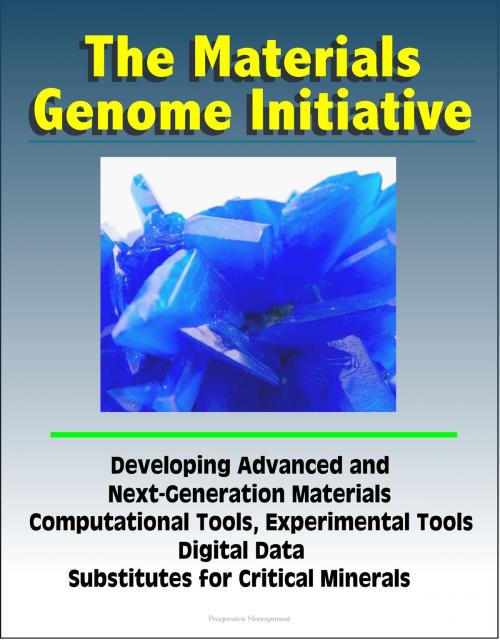The Materials Genome Initiative: Developing Advanced and Next-Generation Materials, Computational Tools, Experimental Tools, Digital Data, Substitutes for Critical Minerals
Nonfiction, Science & Nature, Technology, Material Science| Author: | Progressive Management | ISBN: | 9781301782840 |
| Publisher: | Progressive Management | Publication: | September 13, 2013 |
| Imprint: | Smashwords Edition | Language: | English |
| Author: | Progressive Management |
| ISBN: | 9781301782840 |
| Publisher: | Progressive Management |
| Publication: | September 13, 2013 |
| Imprint: | Smashwords Edition |
| Language: | English |
In much the same way that silicon in the 1970s led to the modern information technology industry, the development of advanced materials will fuel many of the emerging industries that will address challenges in energy, national security, healthcare, and other areas. Yet the time it takes to move a newly discovered advanced material from the laboratory to the commercial market place remains far too long. Accelerating this process could significantly improve U.S. global competitiveness and ensure that the Nation remains at the forefront of the advanced materials marketplace. This Materials Genome Initiative for Global Competitiveness aims to reduce development time by providing the infrastructure and training that American innovators need to discover, develop, manufacture, and deploy advanced materials in a more expeditious and economical way. Prepared by an ad hoc group of the National Science and Technology Council, this initiative proposes a new national infrastructure for data sharing and analysis that will provide a greatly enhanced knowledgebase to scientists and engineers designing new materials. This effort will foster enhanced computational capabilities, data management, and an integrated engineering approach for materials deployment to better leverage and complement existing Federal investments.
The Materials Genome Initiative is a new, multi-stakeholder effort to develop an infrastructure to accelerate advanced materials discovery and deployment in the United States. Over the last several decades there has been significant Federal investment in new experimental processes and techniques for designing advanced materials. This new focused initiative will better leverage existing Federal investments through the use of computational capabilities, data management, and an integrated approach to materials science and engineering.
This document describes a vision of how the development of advanced materials can be accelerated through advances in computational techniques, more effective use of standards, and enhanced data management. Detailed benchmarks and milestones will be laid out in later documents. This document is written for all stakeholders in the materials development community — from experimental and theoretical scientists conducting basic research to industrial engineers qualifying new material products for market. These stakeholders span academic institutions, small businesses, large industrial enterprises, professional societies, and government. With the engagement of all stakeholders in the up-front planning and execution, this initiative will ensure the Nation remains competitive in the manufacturing and use of advanced materials.
In much the same way that silicon in the 1970s led to the modern information technology industry, the development of advanced materials will fuel many of the emerging industries that will address challenges in energy, national security, healthcare, and other areas. Yet the time it takes to move a newly discovered advanced material from the laboratory to the commercial market place remains far too long. Accelerating this process could significantly improve U.S. global competitiveness and ensure that the Nation remains at the forefront of the advanced materials marketplace. This Materials Genome Initiative for Global Competitiveness aims to reduce development time by providing the infrastructure and training that American innovators need to discover, develop, manufacture, and deploy advanced materials in a more expeditious and economical way. Prepared by an ad hoc group of the National Science and Technology Council, this initiative proposes a new national infrastructure for data sharing and analysis that will provide a greatly enhanced knowledgebase to scientists and engineers designing new materials. This effort will foster enhanced computational capabilities, data management, and an integrated engineering approach for materials deployment to better leverage and complement existing Federal investments.
The Materials Genome Initiative is a new, multi-stakeholder effort to develop an infrastructure to accelerate advanced materials discovery and deployment in the United States. Over the last several decades there has been significant Federal investment in new experimental processes and techniques for designing advanced materials. This new focused initiative will better leverage existing Federal investments through the use of computational capabilities, data management, and an integrated approach to materials science and engineering.
This document describes a vision of how the development of advanced materials can be accelerated through advances in computational techniques, more effective use of standards, and enhanced data management. Detailed benchmarks and milestones will be laid out in later documents. This document is written for all stakeholders in the materials development community — from experimental and theoretical scientists conducting basic research to industrial engineers qualifying new material products for market. These stakeholders span academic institutions, small businesses, large industrial enterprises, professional societies, and government. With the engagement of all stakeholders in the up-front planning and execution, this initiative will ensure the Nation remains competitive in the manufacturing and use of advanced materials.















